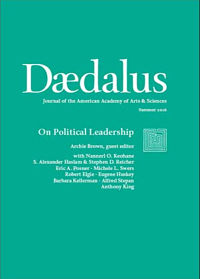Essays: ‘On political leadership’. (2016)

“The yearning for a strong individual leader who will dominate all and sundry is the pursuit of a false god
Published in ‘Daedalus’, the Journal of the American Academy of Arts and Sciences, Summer 2016 issue.
Guest editor: Archie Brown, Emeritus Professor of Politics, University of Oxford
From the Academy’s Press Release:
“Published during the 2016 U.S. presidential election, these essays offer expert insight into the character and quality of effective political leadership.
“The yearning for a strong individual leader who will dominate all and sundry is the pursuit of a false god …Yet, notwithstanding ghastly experience with overweening leaders in many different countries, the craving for a ‘strong leader’ still persists, and is a major factor in the 2016 US presidential election.
“These and other issues of great and topical significance concerning the character and quality of political authority are explored by this multinational and multidisciplinary group of authors.”
Contents include:
Introduction by Archie Brown (University of Oxford). What is effective political leadership? Do we need “strong” individual leadership, or do we need to be protected from it?
Leadership, Equality & Democracy by Nannerl O. Keohane (Princeton University). “only passionate and pragmatic leadership can overcome the dangers of a polity in which the power of money so exceeds the will of the people
Rethinking the Psychology of Leadership: From Personal Identity to Social Identity by S. Alexander Haslam (University of Queensland) & Stephen D. Reicher (University of St. Andrews). Effective leadership is the capacity to mobilize a mass constituency to bring about shared goals. But the same qualities that make one leader effective may render another useless
Presidential Leadership & the Separation of Powers by Eric A. Posner (University of Chicago). What stops presidents from abusing their powers? (The conflicts between) the multifaceted nature of presidential leadership
Women & Legislative Leadership in the U.S. Congress: Representing Women’s Interests in Partisan Times by Michele L. Swers (Georgetown University). (Addresses) the impact of electing more women … the incentive structure of the American electoral system … means that women are not likely to bring more consensus to Washington.
Varieties of Presidentialism and of the Leadership Outcomes by Robert Elgie (Dublin City University). Examines … whether a parliamentary or presidential system is more conducive to the transition to democracy
Authoritarian Leadership in the Post-Communist World by Eugene Huskey (Stetson University). Explores the origins and development of personalistic rule in (the successor states to the Soviet Union).
Leadership – It’s a System, Not a Person! by Barbara Kellerman (Harvard Kennedy School). Calls for the replacement of the lucrative but vapid industry surrounding leadership training and education.
Multiple but Complementary, Not Conflictual, Leaderships: The Tunisian Democratic Transition in Comparative Perspective by Alfred Stepan (Columbia University). Tunisia has had a multiplicity of cooperating leaders, rather than a single “strong leader” or multiple conflictual leaderships.
Against the Führerprinzip: For Collective Leadership by Archie Brown (University of Oxford). Highlights the ineffectiveness and dangerousness of powerful individual leaders.
In Favor of ‘Leader Proofing’ by Anthony King (University of Essex). Argues that there is much to be said for a liberal democracy’s “political culture and institutions having built into them a fair amount of ‘leader proofing.’”
View the press release here: New Dædalus Issue on “On political leadership”
Find a fuller synposis of individual essays here: Table of contents
Print and Kindle copies of the new issue can be ordered here.






Leave a comment
Back to the top